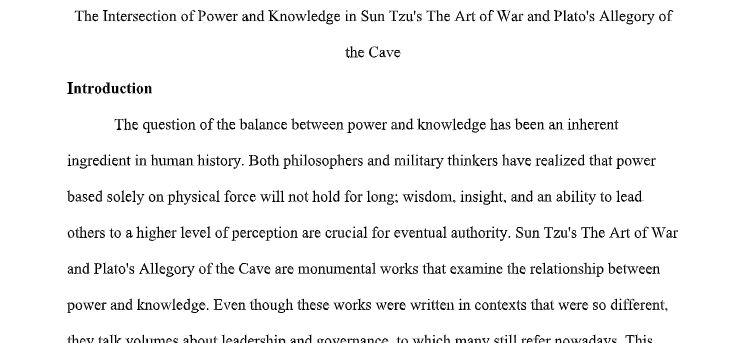Sun Tzu’s The Art of War and Plato’s Allegory
Research Question:
What is the relationship between power and knowledge explored in Sun Tzu’s The Art of War and Plato’s Allegory of the Cave, and how does this relate to contemporary leadership practices?
Working Thesis:
While Sun Tzu’s The Art of War and Plato’s Allegory of the Cave both emphasize the path from
ignorance to enlightenment, Plato emphasizes the importance of strategic wisdom and
knowledge as the basis of power. These works offer timeless insights into effective leadership in
contemporary contexts. These concepts’ convergence emphasizes how knowledge may change a
variety of fields. While Sun Tzu’s emphasis on strategic wisdom highlights the valuable
application of expertise in decision-making, Plato’s emphasis on enlightenment highlights the
moral obligation of leaders to lead people toward truth (Plato, n.p). They offer a thorough
leadership paradigm that balances strategic thinking and ethical discernment.
Proposal Paragraph
I have chosen Plato’s Allegory of the Cave and Sun Tzu’s The Art of War because both
books offer deep philosophical insights into knowledge and power, issues that resonate with
contemporary leadership challenges. I am curious how these old writings might influence
contemporary leadership approaches, especially in politics, business, and military strategy.
Despite its difficulty, Plato’s allegory illustrates how enlightenment bestows authority onto those
who have overcome ignorance (Plato, n.p). On the other hand, Sun Tzu’s manual stresses the
value of intelligence and cunning in exercising power (Tzu, n.p). I want to learn how these
antiquated ideas can be modified to deal with the complexity of modern leadership via my
research (Marchiny, n.p). Balancing the philosophical complexity of these works with real-world applications could be a problem for my project. However, I am eager to discover how these seemingly esoteric ideas can still be helpful.
Answer Preview for Sun Tzu’s The Art of War and Plato’s Allegory

APA
1800 Words
